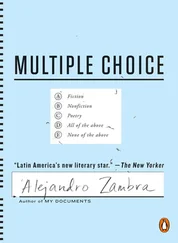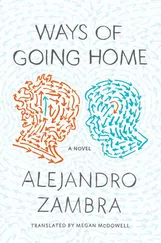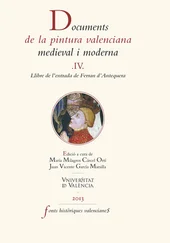If I mention all this it’s only because Camilo always seemed willing to help me. That time in the Chevette, when he realized that I was nervous, he patted my hair and said something I don’t remember, but I’m sure that it was warm, caring, and subtle. Sometime later, when I started telling him about my eccentricities, he told me that everyone was different, and maybe the strange things I did were normal, or maybe they weren’t, but it didn’t matter, because normal people stank.
I could fill many pages writing about Camilo’s importance in my life. For now, I remember that it was Camilo who, after many long and sophisticated arguments, managed to get me permission to go to my first concert. (We saw Aparato Raro at the Don Orione school in Cerrillos.) He was also the first person to read my poems.
I’d written poems since I was little, which was, of course, a shameful secret. They weren’t any good, but I thought they were, and when Camilo read them, he did so respectfully, though he immediately explained that these days poems didn’t rhyme. That was news to me. I’d never read a poem that didn’t rhyme, and I’d always thought that poetry was something unchanging: ancient and immutable. But it was great to hear, since there were times when it cost me the world to find rhymes, and I knew I couldn’t always fall back on the easy combinations.
I asked him what the difference was, then, between a poem and a story. We were stretched out by the pool — in full-on photosynthesis, as he would say. He looked at me with a pedagogical expression and told me that a poem was the exact opposite of a story. “Stories are boring. Poetry is madness, poetry is savage, poetry is a torrent of extreme emotions,” he said, or something like that. It’s difficult not to start inventing, not to let myself be carried along on the scent of memory. He definitely used the words madness, savage , and emotions. Torrent , maybe not. I think extreme , yes.
Back at home, he picked up my notebook and started to write poems himself. It took him maybe half an hour to write ten or twelve long texts, and then he read them to me. I didn’t understand a thing. I asked him if other people understood his poems. He told me that people might not understand them, but that wasn’t the important thing. I asked him if he wanted to publish a book. He told me yes, he was sure he would, but that wasn’t the important thing, either. I asked him what the important thing was. And he said this, or this was what I understood: “The important thing is to express your feelings, to show yourself as a passionate, interesting man, maybe a bit fragile, someone who isn’t afraid of anything, someone who accepts his feminine side.” That was definitely the first time I heard the expression “feminine side.”
Another day, not long after that, he asked me if I liked men or women. I was a bit alarmed, because there were certainly guys that I liked — Camilo himself, for example — but I was quite sure that I liked girls more, much more. “I like girls,” I told him. “I like them a lot. I think they’re hot as hell.”
“Okay,” he said, very seriously, and then he added that if I liked guys it was all right — that happened sometimes too.
***
I remember Camilo that afternoon, standing on the bow-shaped bridge in Providencia, smoking. I could tell it was not your usual cigarette, but I didn’t know exactly what it was. “It’s too strong for a kid,” he said in apology when I asked him for a drag, because by then I’d started smoking, once in a while. This must have been 1986 or early 1987; I was ten or eleven years old. I’m sure of that because at that age I still didn’t know my way around Providencia or downtown Santiago very well, and also because later that day we went to buy True Stories by the Talking Heads, which was still a new album then.
“We have to solve your problem,” Camilo had told me that morning as we were walking toward the bus stop. I asked him which problem, because I thought I had a lot, not just one. “Your shyness,” he replied. “Women don’t like shy men.” And I really was shy back then; I’m talking about genuine shyness, not the kind you see now, when so many things are blamed on shyness it’s almost a joke. If someone doesn’t say hi, it’s because he’s shy; if a guy kills his wife, it’s because of shyness; if he cheats a whole town, if he runs for office, if he eats the last bit of Nutella from the jar without asking anyone: shy. No, I’m talking about something else: stuttering, introspection, insecurity.
“I’m going to help you,” Camilo told me. “I’m going to give you a lesson, but don’t worry, you won’t have to do anything — just don’t leave my side, no matter what I do.” I nodded, feeling a bit dizzy. During the hour-long bus ride, he told me jokes, most of them ones he’d told me before, but this time he told them in a very loud voice, all but shouting. I thought the lesson was that I had to laugh equally loudly, which was very hard for me, but I tried. Then, as we were getting off the bus, he told me that that hadn’t been the lesson.
We went up onto the bridge and stopped halfway across. Camilo smoked in silence, while I looked down at the murky, rushing water of the river, which was higher than usual. I focused on the current, until I was so concentrated that I had the feeling the water was standing still and we were aboard a moving boat, although I’d never been on a boat in my life. I stayed like that for a long time, fifteen, maybe twenty minutes. “We’re on a boat,” I said to Camilo. I had trouble explaining; he didn’t get it, but then, suddenly, he saw it too, and let out a cry of profound and growing astonishment. We went on gazing at the current while he repeated, “Incredible, incredible, incredible.”
Afterward, as we were walking toward Providencia, he told me that he now respected me. He added, emphatically, “I liked you a lot before, I still like you a lot, but now I respect you, too.” When we got to an intersection, maybe Providencia and Carlos Antúnez, he looked at me, made a subtle, sharp movement with his head that meant now , then threw himself to the ground, clutching his stomach, and started laughing extravagantly, scandalously. A group of people gathered around us right away, and I did not want to be there, but I understood that this was the lesson. When he finally stopped laughing, there were five policemen there asking him for an explanation. Camilo gave me a nod of approval — I had stayed beside him the whole time, and I had even laughed a little, too. I watched the cops’ faces, impassive and severe, while Camilo rattled off a disjointed explanation in which he talked about me and my shyness, and how it was necessary to teach me this lesson so that I could, he told them, grow. He had disrupted the public order, we were living under a dictatorship, but Camilo managed to placate the policemen, and we walked away after making the strange promise never to laugh in a public place again.
“I’m really high,” Camilo said to me, or maybe he said it to himself, a little concerned. We went to a store to buy the Talking Heads album. The place seemed different from any record store I’d been to — everything struck me as luxurious and exclusive. When the sales clerk handed us True Stories , Camilo translated the opening lyrics of “Love for Sale” for me, though he may have gone a little off course, since he didn’t know any English. I took the album from him, examined its red-and-white cover, and then I gave him the same quick gesture he’d given me: now . He barely had time to acknowledge it with a panicked look before I took off with the record in my hands, and we went running, dodging pedestrians at full speed, for a long time, laughing like crazy.
Читать дальше












